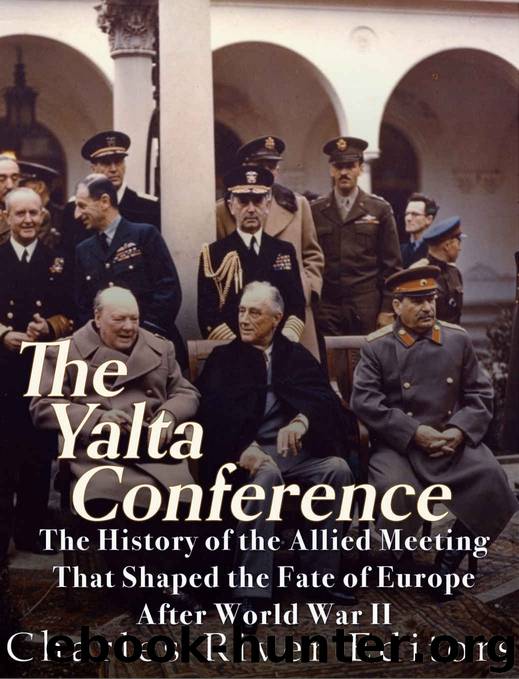The Yalta Conference: The History of the Allied Meeting that Shaped the Fate of Europe After World War II by Charles River Editors

Author:Charles River Editors
Language: eng
Format: epub
Publisher: Charles River Editors
Published: 2016-05-19T16:00:00+00:00
Churchill and Stalin
The dinner conversation naturally turned to the topic of the summit itself, and the United Nations. Stalin said that the larger powers (the USSR, USA, and British Empire) should essentially govern the postwar world, and the small nations be permitted to offer their opinions but not interfere with the plans of the major countries. Churchill, for once, agreed with the Soviet strongman at least in spirit, famously stating, “The eagle should let the small birds sing and care not wherefore they sang.” This statement paraphrased part of a speech delivered in William Shakespeare's Titus Andronicus. Roosevelt, however, still preferred the notion of all the “birds” having an equal voice in decision-making, the system actually adopted.
While the Big Three talked, Soviet Deputy Foreign Minister Andrei Vyshinsky engaged in a rather sharp-edged exchange with Charles Bohlen: “When the leaders began discussing the right of dissent within countries, Vishinsky turned to me and said that he thought that the American people should learn to obey their leaders and not question what they were told to do. I replied with some sarcasm that I would like to see him go to the United States and tell that to the American people. With a grin, Vishinsky said that he would be glad to do so.” (Bohlen, 1973, ).
Cracks appeared in the British delegation as a loud argument erupted between Churchill and Sir Anthony Eden after dinner. Churchill maintained that the Big Three plus China should be the main arbiters of the United Nations, while Eden, favoring votes for all countries, threatened to bring the matter before Parliament.
Before the start of talks on February 5th, Roosevelt ate lunch with Harry Hopkins, a leisurely meal enabling 90 minutes of discussion between the two Americans. Hopkins briefed the president on the details of the agenda, and also presented a plan for detaching the Ruhr and Saar industrial regions from Germany for direct Allied administration, while leaving the rest of the nation largely intact. Roosevelt expressed his liking for this scheme.
Roosevelt took the initiative at the start of the second day's meeting, which began at 4:15 PM. The American president attempted to set the agenda by saying that he wanted to use the session to decide on zones of occupation in Germany. He also proposed including a French zone, handing Stalin a map prepared by his staff showing a possible division of German territory between the U.S., British, French, and Soviets.
After Roosevelt's surprising acumen the day before in the discussion of Soviet railway modifications, Stalin seemed determined to regain the dominant position in the talks. Rather than responding to FDR's map and statement, he ignored both and instead peppered the other two men with a list of items he wanted to discuss: reparations payments from the Germans to the Allies, the form of government in conquered Germany, the precise meaning of “unconditional surrender,” and the matter of dismembering the German state, which Roosevelt raised previously at Tehran.
Roosevelt tried to regain control of the negotiations by suggesting these items could be folded into his larger discussion about occupation zones.
Download
This site does not store any files on its server. We only index and link to content provided by other sites. Please contact the content providers to delete copyright contents if any and email us, we'll remove relevant links or contents immediately.
The Radium Girls by Kate Moore(12033)
100 Deadly Skills by Clint Emerson(4929)
Rise and Kill First by Ronen Bergman(4792)
The Templars by Dan Jones(4690)
The Doomsday Machine by Daniel Ellsberg(4492)
The Rape of Nanking by Iris Chang(4217)
Killing England by Bill O'Reilly(4006)
Stalin by Stephen Kotkin(3970)
Hitler in Los Angeles by Steven J. Ross(3947)
12 Strong by Doug Stanton(3553)
Hitler's Monsters by Eric Kurlander(3344)
Blood and Sand by Alex Von Tunzelmann(3206)
The Code Book by Simon Singh(3193)
Darkest Hour by Anthony McCarten(3134)
The Art of War Visualized by Jessica Hagy(3012)
Hitler's Flying Saucers: A Guide to German Flying Discs of the Second World War by Stevens Henry(2757)
Babylon's Ark by Lawrence Anthony(2683)
The Second World Wars by Victor Davis Hanson(2528)
Tobruk by Peter Fitzsimons(2520)
